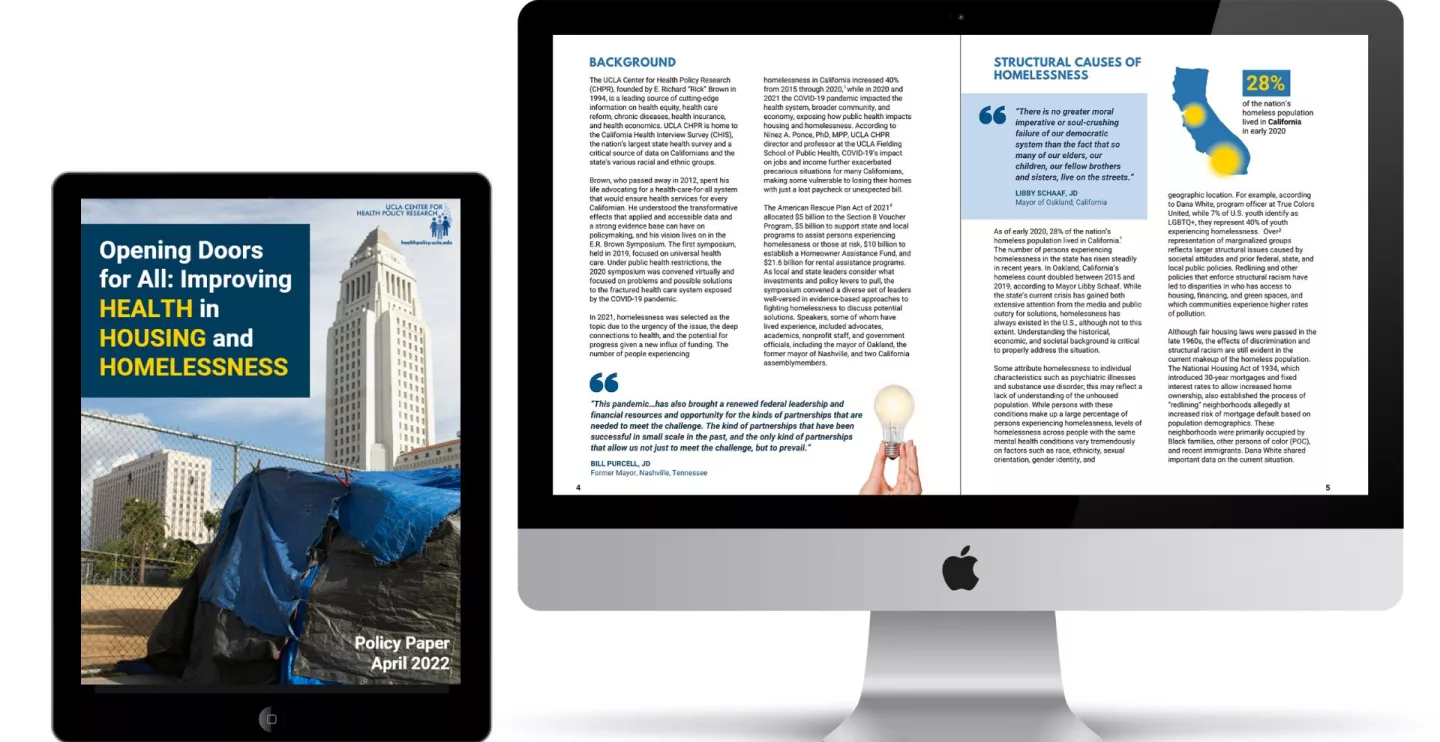California’s homelessness crisis is unprecedented. In early 2020, more than 160,000 people experienced homelessness on any given day, representing a 40% increase since 2015. The health effects on individuals experiencing housing insecurity have been profound, including outbreaks of hepatitis A and typhus in communities experiencing homelessness, as well as the COVID-19 pandemic, which has further impacted our health system, broader community, and economy, and exposed how public health impacts housing and homelessness.
During fall 2021, the UCLA Center for Health Policy Research (CHPR) convened a virtual event to bring together key voices — state and local legislators, academics, nonprofit organizations, advocates, health leaders, and people with lived experience — for two days of thoughtful discussions on past successes, lessons learned, barriers, and potential solutions to create a healthier, more prosperous California for all.
Focused on the intersection of health and homelessness, the 2021 E.R. Brown Symposium, Opening Doors for All: Improving Health in Housing and Homelessness, highlighted evidence-based strategies to help wrestle with this crisis at a time when state lawmakers have a significant budget surplus available to potentially invest in addressing homelessness.
As local and state leaders consider what investments and policy levers to pull, UCLA CHPR released a policy paper from the symposium that synthesizes key findings, barriers, and potential solutions. The paper describes the need for a well-coordinated effort among policymakers, community-based organizations, people with lived experience, health systems, and government agencies at the federal, state, and local levels.
Some of the key takeaways of the symposium include:
Good health is not possible without housing. Lack of housing leads to deterioration of mental and physical health due to high stress, exposure to the elements, inadequate sanitation, lack of access to hygiene supplies, and poor nutrition.
Homelessness is often the result of structural issues rather than individual characteristics. The primary driver of homelessness in California is a lack of affordable housing, especially for those earning an extremely low income. Other drivers of homelessness include historical discrimination and structural racism.
To address the effects of structural racism, any new project should begin with a racial equity analysis to assess the potential effect on different racial and ethnic groups. Such analyses can help reduce existing inequities and avoid unintended negative consequences that affect marginalized groups.
People experiencing homelessness need privacy, autonomy, and safety. Small single cabins (“tiny homes”) where individuals can secure their belongings; get sleep without interruption; bring a spouse, partner, children, or pets; and be linked with services and permanent housing is a better option than a traditional group shelter.
Permanent supportive housing should be the goal. This model provides long-term housing coupled with intensive case management services linking individuals with medical, psychological, and other important social services.
Policy and program development should always involve people with lived experience. Their historical exclusion from these discussions has resulted in missed opportunities and wasted resources.
The paper also suggests that privately funded initiatives, which have more flexibility than publicly funded programs, may result in more innovation and experimentation. An excellent example is the Keep Oakland Housed campaign, which in its first two years prevented nearly 5,000 households from becoming homeless.
Addressing health and homelessness requires engagement, healing, resources, social change, leadership, and commitment across our society, starting in every community and neighborhood. Most notably, the paper notes that short-term, medium-term, and long-term efforts must be pursued at the same time.
In the short term, confidence-building measures are necessary to get partners together, foster collaboration, and generate political and public support to move forward. People experiencing homelessness must be treated with dignity and respect; they must be given a non-token role in developing programs and policy. The urgent need for additional permanent supportive housing must not only be met, but to house the most people most quickly, current qualification requirements must be modified or even eliminated.
In the medium term, policies, programs, and their implementation must be evaluated in the most impartial and transparent manner possible. Findings must be disseminated widely and quickly to catalyze action. In addition, evidence development must be treated not just as cataloging what worked where, but as an ongoing process that needs constant refinement and adaptation.
In the long term, the systematic and structural obstacles responsible for homelessness must be dismantled. Only through permanent change will we ensure adequate health care and housing be created for all.
The UCLA Center for Health Policy Research (CHPR) is one of the nation’s leading health policy research centers and the premier source of health policy information for California. UCLA CHPR improves the public’s health through high quality, objective, and evidence-based research and data that informs effective policymaking. UCLA CHPR is the home of the California Health Interview Survey (CHIS) and is part of the UCLA Fielding School of Public Health and affiliated with the UCLA Luskin School of Public Affairs.




